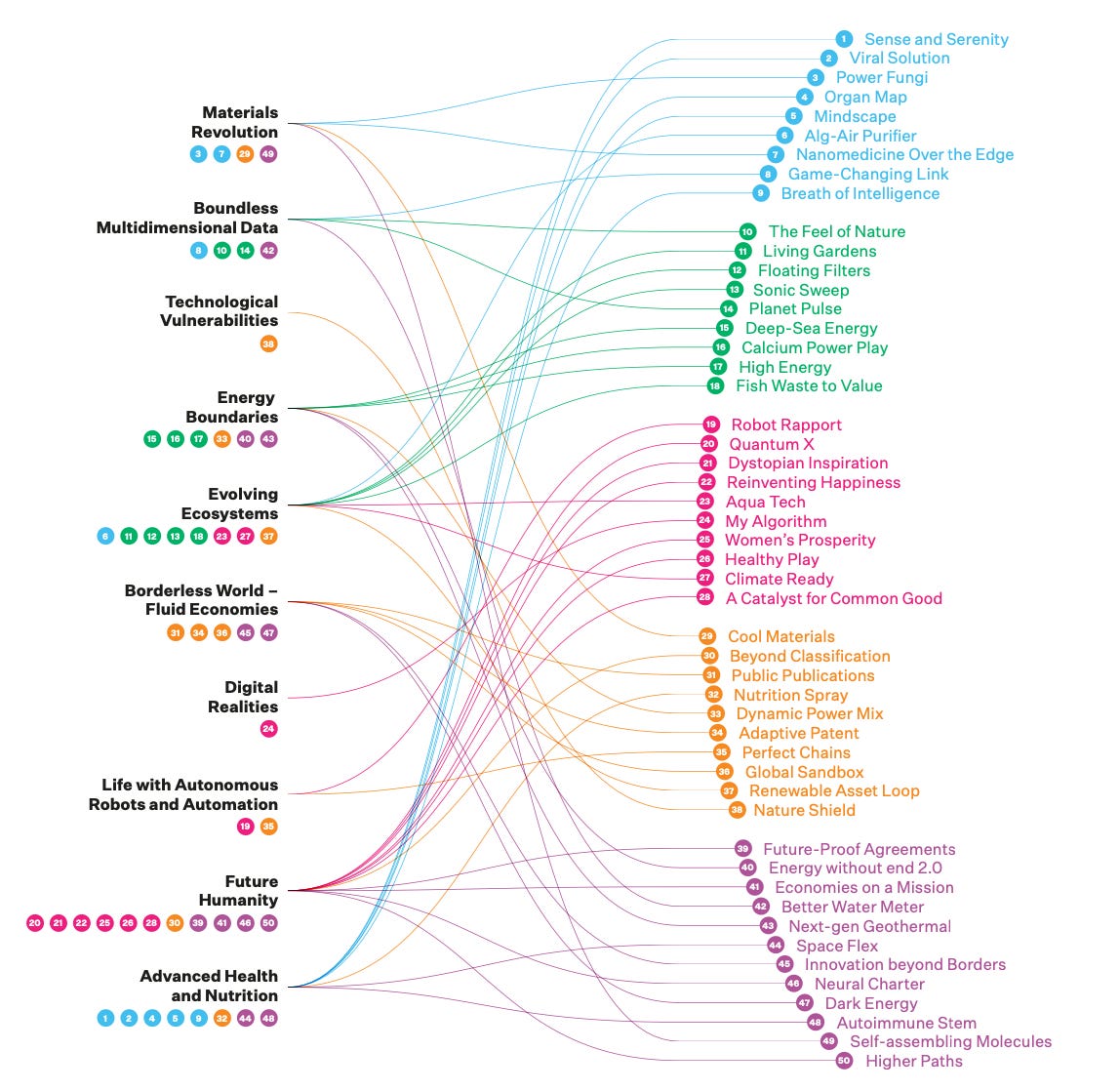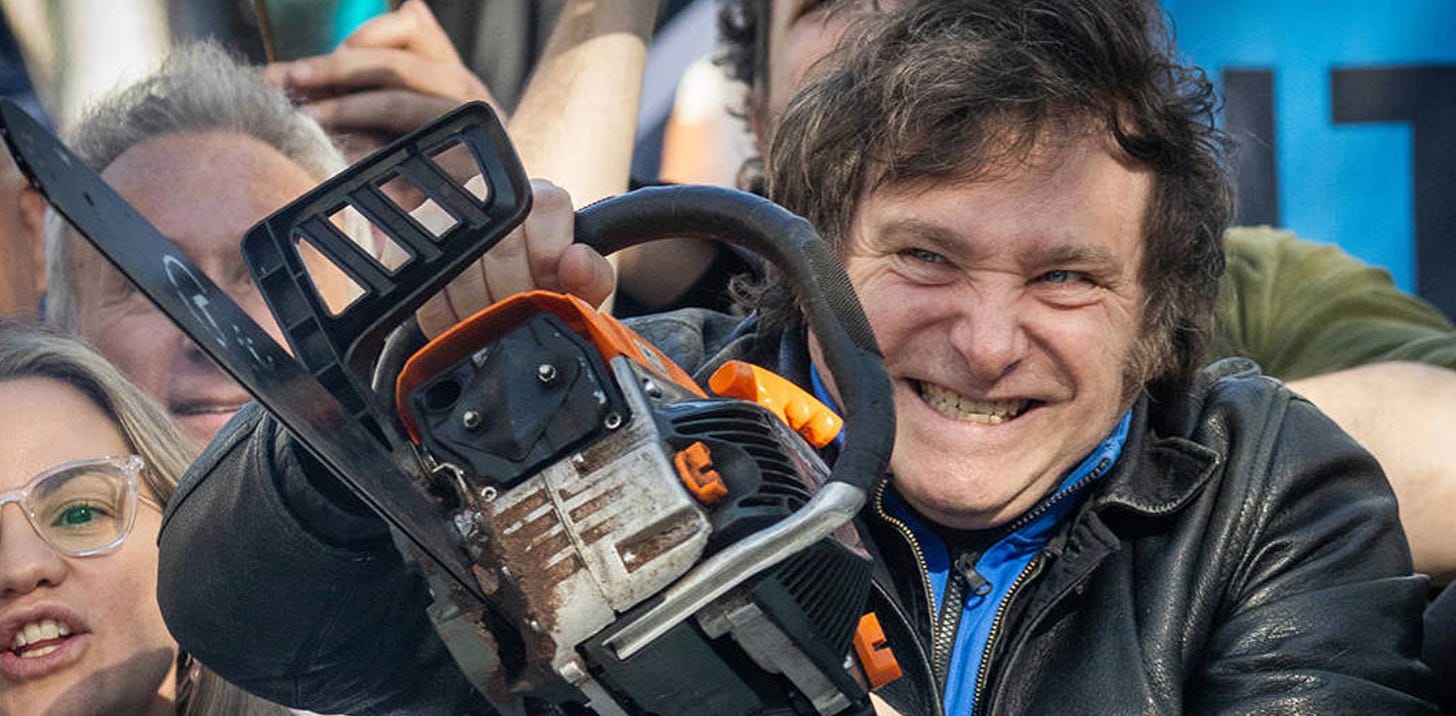Four For Friday | April 11, 2025
LF168 | Dubai 50, human body factories, funders' egos, Governments as startups + AI bonus: Reve Image. New this week: an accompanying audio version.
Welcome to this week’s Four For Friday. Four things that have piqued my interest this week, together with a bonus: AI Tip of The Week. New! Episode audio available here (experimental):
The Dubai 50
The latest annual Global 50 from Dubai Future Forum is weighty, insight-packed report about emerging futures that’s worth an hour of your weekend reading time.
The report identifies certainties (longer lives, tech progress, inequality) and uncertainties (level of global collaboration, shared valued, systems resilience, nature and technology). They pick two key uncertainties: Nature and Technology that frame the shape of things to come.
For Nature, the alternatives are Degradation or Renewal. I thought their nuanced take on Technology was interesting; they framed it as the extent to which technology is used to enhance productivity and our quality of life, on the spectrum of ‘As Master’ or ‘As Multiplier’. These shape four scenarios: Decline, On The Edge, A Balancing Act or A New Era:
The report identifies 10 Megatrends, including Materials Revolution, Technological Vulnerabilities, Evolving Ecosystems and Fluid Economies. And from these, identifies 50 key opportunities - below. A number of these relevant for healthspans fans:
Organ Map. A small blood sample can identify the age of specific organs enabling personalised interventions and prevent organ failure.
Mindscape. Early brain health education and policy to build cognitive reserve for lifelong mental resilience, reducing dementia risk.
Nanomedicine. AI and genomics to use nanomedicine for precision treatments for age-related diseases.
Game-Changing Link. Sports analytics and big data to improve public health through early detection and prevention of diseases.
Autoimmune Stem: AI for precise stem cell therapy, aiming for permanent remission of autoimmune diseases.
Given how rich and interesting this report is, so I turned it into its own audio overview here:
The So What? A thoughtful take on the future - the So What for me is not whether any opportunity is correct, but how to get this type of thinking included in today’s education systems and short-term political slugging matches.
Ethically sourced human bodies: bodyoids
Continuing the theme of Big Future Ideas, this article addresses the initially confronting idea that we’d make more progress in solving diseases if we had access to more human bodies to test on. It suggests we’ll be able to create brainless human "bodyoids"—lab-grown bodies without consciousness.
It’s not that controversial nowadays to grow new neurons from skin cells (I’ve been involved with a project that does this in the past). What gets trickier to accept - but also more valuable for science - is when you start to create full organs and put them together, to see how the body actually works. If done well, these could provide unlimited organs e.g. for transplantation and drug-testing, while eliminating animal testing. Though technically feasible, this poses some gnarly ethical hurdles to overcome.
The So What? A canary-in-the-coal mine topic that would be good to engage people in a new kind of democratic decision making - perhaps a topic for citizen assemblies?
Rethinking Philanthropy: Missions > Ego
Ego is often near the surface of bold philanthropists, especially self-made billionaires who feel, with some justification, that they have a track record of making a difference. This article from the Stanford Social Innovation Review suggests it’s time for philanthropists and funders to eschew their instincts to go it alone and instead create ‘collectively owned’ (CO) strategies.
The alternative, default ‘funder owned’ strategies, mean that innovators have to go around tailoring their pitches and deliverables to whoever is writing a check. A CO approach gets organizations ‘rowing in the same direction’ and is based on alignment, cohesion and agility:
Alignment: Convene representatives of the whole field and cocreate a holistic narrative.
Cohesion. Set goals based on the collective vision and combined strengths to attain them.
Agility. Stay agile to ensure collective momentum: This necessitates adaptability and continuous learning among partners to adjust to evolving circumstances.
This approach should reduce siloed problem-solving in favor of shared governance and open-source solutions, resulting in accelerated impact and reduced duplication. Yet, issues remain: Who orchestrates, and how? Can trust-based ecosystems scale without fragmenting? And who arbitrates conflicting priorities?
The So What? Improving coordination of the available dollars to solve today’s crises would be a win. How best do we orchestrate and navigate egos?
Governments are not startups
A new article by Mariana Mazzucato on the alluring danger of ‘innovators’ using the language of startups and disruption to remake government into something it’s not.
Attempts to run governments like businesses fundamentally misunderstand their distinct purposes. While startups prioritise rapid iteration and investor returns, effective governance requires managing complex interconnected challenges over long timescales. Rather than chasing Silicon Valley's "disruptive" ethos, governments need strategic awareness, adaptive capabilities and outcome-oriented approaches. Musk's DOGE crusade exemplifies this dangerous category error that undermines public-sector effectiveness.
The So What? The tragedy of Elon is that he’s gone from a once-in-a-generation business superhero to destructive arch villain in the space of a few months. A middle ground that engages that kind of innovator-visionary talent within a longer-term, multi-stakeholder reality of government would be game-changing.
Bonus: AI Tool of the Week: Reve
Reve Image generator is gathering a lot of fans. It’s up there with Open AI’s latest image creation tool.
That’s all for this week. As always, feedback welcome, especially on the new audio features.
- Stephen





